

Detroit files for bankruptcy - Jul. 18, 2013. The bankruptcy was filed by Emergency Manager Kevyn Orr and approved by Michigan Gov.
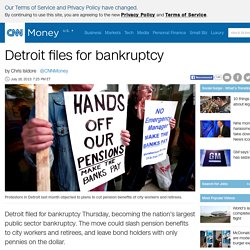
Rick Snyder. Snyder said the financial condition of the city left him no choice. "Now's our opportunity to stop 60 years of decline," Snyder said at a Friday news conference with Orr. "How long had this been going on and people were kicking the can down the road and not doing something? We're doing something. " Snyder has said that 38% of the city's budget is being spent on "legacy costs," such as pensions and debt service. "Does anybody think it's OK to have 40-year-old trees growing through the roofs of dilapidated houses," Orr said.
Related: 16 things that are wrong in Detroit. Detroit files for bankruptcy after decades of decay. DETROIT, USA (AP) -- The city of Detroit, which for years paid its bills with borrowed money, is the largest city in US history to file for bankruptcy protection.
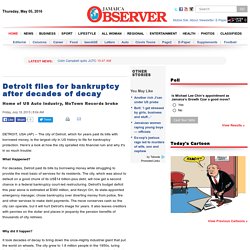
Here's a look at how the city spiralled into financial ruin and why it's in so much trouble: What Happened? For decades, Detroit paid its bills by borrowing money while struggling to provide the most basic of services for its residents. The city, which was about to default on a good chunk of its US$14 billion-plus debt, will now get a second chance in a federal bankruptcy court-led restructuring. Detroit's budget deficit this year alone is estimated at $380 million, and Kevyn Orr, its state-appointed emergency manager, chose bankruptcy over diverting money from police, fire and other services to make debt payments. Why did it happen? It took decades of decay to bring down the once-mighty industrial giant that put the world on wheels.
Why did Detroit go bankrupt? DETROIT – The city of Detroit, which for years paid its bills with borrowed money, is the largest city in U.S. history to file for bankruptcy protection.

Here’s a look at how the city spiraled into financial ruin and why it’s in so much trouble: For decades, Detroit paid its bills by borrowing money while struggling to provide the most basic of services for its residents. The city, which was about to default on a good chunk of its $14 billion-plus debt, now will get a second chance in a federal bankruptcy court-led restructuring. Detroit's biggest crime problem: Lack of police, poll finds. Detroit — Detroiters overwhelmingly feel the biggest contributor to crime is a lack of police on the streets — and they'd gladly pay more taxes to hire more officers, according to a poll commissioned by The Detroit News and funded by the Thompson Foundation.
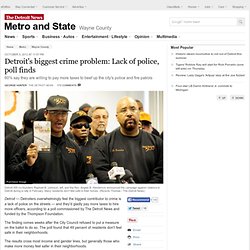
The finding comes weeks after the City Council refused to put a measure on the ballot to do so. The poll found that 49 percent of residents don't feel safe in their neighborhoods. The results cross most income and gender lines, but generally those who make more money feel safer in their neighborhoods. The survey also found that residents have mixed views of the Police Department, but generally liked Police Chief Ralph Godbee.
Residents were surveyed, however, before a sex scandal that exploded last week. The Face of Pension Reform: Detroit Firefighters Lament Potential Cuts. In February 2007, Walt Grysko was barreling through the streets of Detroit en route to a fire when his firetruck was t-boned by a car exceeding 70 miles per hour.

The crash sent Grysko through the windshield and hurled him 60 feet away, breaking his back in five places. A 911 response in Detroit takes how long?- MSN Money. For some people in Detroit, calling 911 isn't an option anymore.
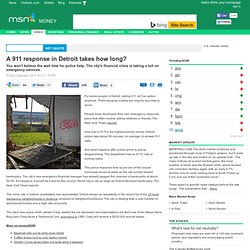
That's because it takes too long for any help to arrive. People have developed their own emergency response plans that often involve calling relatives or friends, The New York Times reports. How bad is it? For the highest-priority crimes, Detroit police take about 58 minutes, on average, to answer 911 calls. And what happens after police arrive is just as disappointing: The department has an 8.7% rate of solving cases. As Detroit breaks down, scourge of arson burns out of control.
Detroit plans to sell off closed fire stations. By Bryan Dyne 5 June 2013 Eight vacant buildings once operated by the Detroit Fire Department─seven fire stations and the former firehouse headquarters─are being sold by the city of Detroit to private investors and developers to be transformed into restaurants, wineries or micro-distilleries in an effort to raise money for the city.

The minimum bid for the fire stations are $637,000 while the former headquarters is being sold for $1.25 million. It is not yet clear who has bought the fire stations or for what price, though it is known that Southfield, Michigan developer Walter Cohen has plans to purchase the former headquarters and turn it into a boutique hotel. He plans to have eighty upscale rooms and a Cajun restaurant on the first floor. Cohen has previously been involved in the gentrification of the Park Shelton residential buildings. The stations to be sold include Ladder Nos. 8, 12, 16 and 38 and Engine Nos. 10, 18 and 49. The Vinewood fire station which once housed Engine No. 10.
Detroit firefighters speak out on bankruptcy. By Tim Rivers and Jerry White 29 July 2013.

Detroit Fire, Police Departments Suffer Deep Cuts. Pay cuts coming to Detroit police, fire officers - Aug. 2, 2013. The 10% cuts apply to 1,200 police lieutenants and sergeants and 400 comparable officers in the fire department.
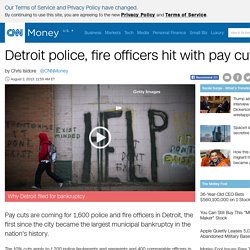
The cuts, announced this week, will take effect in September. Bill Nowling, spokesman for Kevyn Orr, the emergency manager overseeing the city's reorganization effort, said other city employees took the same 10% cut in 2012. The cuts for these officers was delayed because of union contracts that were in effect. "We had to make this cut due to disparity between management and rank and file," said Nowling. He said the city will save $4.5 million from these latest cuts. "These pay cuts and the savings have already been baked into the budget. Related: New hockey arena still a go in Detroit. Detroit police response times down, but official numbers questioned.
When state-appointed Emergency Financial Manager Kevyn Orr first pleaded with a federal bankruptcy court to help Detroit in July 2013, he made his case with sobering statistics: the city's high levels of poverty, blight and abandonment, its declining population and tax revenues, and its insane crime rate.

Orr pointed out how long it took police, on average, to get to the highest-priority crimes: Fifty-eight minutes, or nearly an hour. It was partial proof the city couldn't "meet obligations to its citizens," Orr told the court. It was a shocking number - and one repeated by Gov. Rick Snyder, the man who appointed Orr. And in December 2013 U.S. Now, nearly a year after Detroit's emergence from bankruptcy, Detroit Police Chief James Craig says response times have fallen below 15 minutes; and Mayor Mike Duggan, who loves data and scorecards, regularly touts the precipitous reduction with similar numbers.
"You remember those days? A shaky benchmark Uncertain origin The meaning of "urgent" These 8 graphs show Detroit's progress since declaring bankruptcy. Giving No Time to Misleading Police Stats - The Numbers.